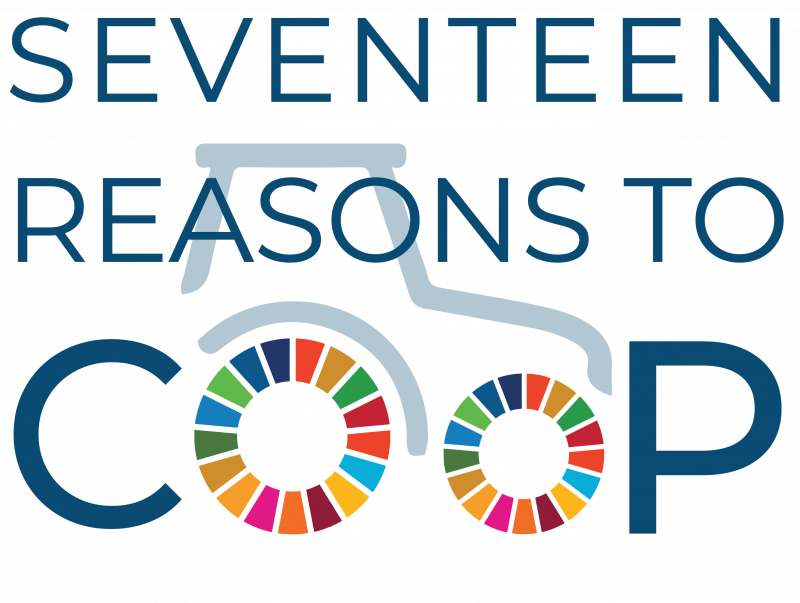
Agriculture, which accounts for 10% of the EU's greenhouse emissions, has a key role to play in tackling climate change and meeting the UN’s Sustainable Development agenda.
Some major initiatives have already delivered results and the European Environmental Agency says the EU’s emissions from agriculture fell by 24% between 1990 and 2012 – going against global trends.
But weather fluctuations, warmer air temperatures and reduced rainfall are hurting European farmers, who are on the frontline of climate change.
European agri-food, forestry and fishery cooperatives recognise the need for efficiency and are taking every available opportunity to cut emissions. They know the impact of their operations from the farm to store and want to be part of the solution.
As the voice of EU agricultural cooperatives, Cogeca is working to make the EU agriculture and agri-food sector sustainable, market-oriented, innovative and competitive. It represents 22,000 agricultural cooperatives with seven million farmer-members, employing over 600,000 people.
In 2019 Cogeca launched the campaign 17 Reasons to Coop to promote agri-food and forest cooperatives via an online interactive map to show long-term progress on sustainability.
Among those featured is Irish cooperative Carbery, which has been offsetting carbon emissions and increasing biodiversity through a tree-planting project. In collaboration with SWS Forestry, the cooperative launched the Carbery Tree Project, which gave 45,000 trees to local farmers and employees. Through its Carbery Millennium project, the cooperative also planted two acres of oak trees - critical for biodiversity and a key part of Irish heritage.
With global demand for food expected to grow by up to 70% in the coming decades, meeting demand while reducing environmental impact is crucial. Many cooperatives are already doing this. Cogeca’s website features over 80 case studies of how agricultural cooperatives are contributing to meeting the SDGs. Browse the map here.
Agri-food cooperative Valio, owned by Finnish milk suppliers, is setting targets to reduce emissions. Valio was already aiming for a net zero carbon footprint for milk by 2035. The targets are based on the Paris climate agreement target of limiting climate warming to 1.5°C.
In Greece the PINDOS loannina Agricultural Poultry Farming Cooperative invests actively in environmental protection. It runs a modern biological treatment unit, has constructed a power plant that burns inactive bird waste, and owns a plant that converts waste from poultry farms into the organic fertiliser Agrosyn. The cooperative plans to create two more units.
Dairy co-op Arla Foods has also embarked on a sustainability journey. In 2019 the cooperative, which is owned by 10,300 farmers, pledged to reduce greenhouse emissions by 30% per kilo of milk over the next decade and to work towards carbon net zero by 2050. Arla’s new strategy covers the whole value chain from cow to consumer and addresses climate, air, water and nature. While cattle methane emissions cannot be completely eliminated, they can be significantly reduced, for example through improved feed – one area where Arla is funding research.
Arla is also working with farmers to quantify and increase the carbon captured and stored in the soil. Since 2013, almost 700 on-farm meetings have been conducted to educate groups of farmers on sustainability measures and more than 5,000 climate assessments have been conducted on Arla farms.
European agri-cooperatives are also investing in technologies and adopting targeted programmes to tackle climate change.
Among many agri-cooperatives across the EU are developing new solutions and business models to improve energy efficiency along the chain and to streamline the bioeconomy among primary producers. It is clear that the energy and agriculture nexus is not just about a trade-off: it also provides significant opportunities for synergies, which bring benefits for farmer-members.
In addition to this initiative, Cogeca has also launched the European Award for Cooperative Innovation – The award celebrates outstanding innovations and excellence in the agri-food, fishery and forestry sectors. The 2020 edition will focus on “Sustainability-driven innovation” and the creation of new products and services, market space, processes and business models driven by economic, social or environmental objectives. The award will be granted to those European agri-cooperatives with the most innovative projects, with significant contributions in Economic Value Creation, Social Value Creation and Environmental Value Creation.




